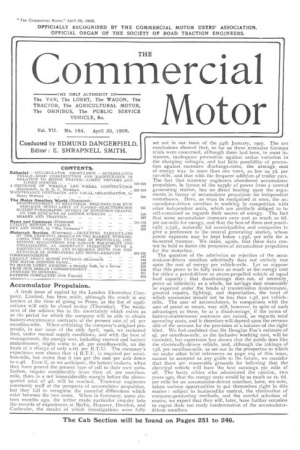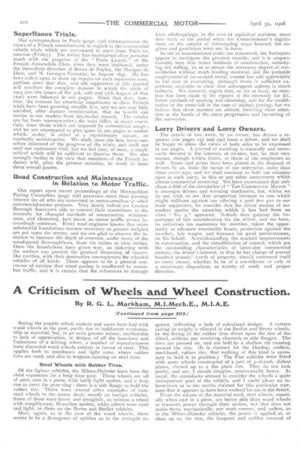Accumulator Propulsion.
Page 1

Page 2

If you've noticed an error in this article please click here to report it so we can fix it.
A fresh issue of capital by the London Electrobus Company, Limited, has been made, although the result is not known at the time of going to Press; as the list of applications will only be closed to-day (Thursday). The weakness of the scheme lies in the uncertainty which exists as to the period for which the company will be able to obtain battery-maintenance contracts at the present rate of 2d. per omnibus-mile. When criticising the company's original proposals, in our issue of the 26th April, 1906, we reckoned that, under normal supply conditions, and with the best of management, the energy cost, including current and battery maintenance, might come to 4d. per omnibus-mile, on the basis of a charge of only o.6d. per B.T.U. The company's experience now shows that i.i B.T.U. is required per omnibus-mile, but state's that it can get the cost per unit down to o.4(1. Even if, as we anticipate, the battery makers, when they have proved the present type of cell to their own satisfaction, require considerably more than 2d. per omnibusmile, there is a not inconsiderable margin before the abovequoted total of 4d. will be reached. Tramway engineers commonly scoff at the prospects of accumulator propulsion, but they fail to recognise the essential differences which exist between the two cases. When in Germany, some sixteen months ago, the writer made particular enquiry into the records of experiences at Berlin, Hanover, Dresden, and Carlsruhe, the results of which investigations were fully
set out in our issue of the 24th January, 1907. The net conclusions showed that, so far as these extensive German trials were concerned, although there had been, in most instances, inadequate precaution against undue variation in the charging voltages, and but little possibility of precaution against excessive discharge-rates, the average cost of energy was. in more than one town, as low as 3d. per car-mile, and that with the frequent addition of trailer cars. The fact that tramway engineers abandoned accumulator propulsion, in favour of the supply of power from a central generating station, has no direct bearing upon the arguments in favour of accumulator propulsion for independent motorbuses. Here, as must be recognised at once, the accumulator-driven omnibus is working in competition with other independent -units, which are similarly obliged to be self-contained as regards their source of energy. The fact that some accumulator tramcars once cost as much as 6d. per car-mile for energy, and that the best of them cost practically 2.75d., naturally led municipalities and companies te give a preference to the central generating station, whose power expenses may be kept below 1.75d. per mile for a 6o-seated tramcar. We insist, again, that these data cannot be held to damn the prospects of accumulator propulsion for the motorbus.
The question of the admission or rejection of the accumulator-driven omnibus admittedly does not entirety rest upon the cost of energy per vehicle-mile. Let us suppose that this prove to be fully twice as much as the energy cost for either a petrol-driven or steam-propelled vehicle of equal load capacity : that disadvantage does not, of necessity, prove an inferiority as a whole, for savings may reasonably be expected under the heads of tranSmission maintenance, general repairs, lighting, and depreciation, the total of which economies 'should not be less than 1.5d. per vehiclemile. The user of accumulators, in comparison with the user of petrol or steam, may still, however, in spite of such advantages as these, be at a disadvantage, if the terms of battery-maintenance contracts are raised, as regards total operating costs, and it therefore will depend upon the revenue side of the account for the provision of a balance of the right kind. We feel confident that Sir Douglas Fox's estimate of O. per omnibus-mile, as the inclusive working cost, will be exceeded, but experience has shown that the public does like the electrically-driven vehicle, and, although the takings of 13d. per omnibus-mile, as set out in the prospectus to which we make other brief references on page 225 of this issue, cannot be accepted as any guide to the future, we consider that there are reasonable grounds for believing that the electrical vehicle will have the best earnings per mile of all. The hasty critics who adventured the opinion, two years ago, that the energy costs would be as much as Is. 6d. per mile for an accumulator-driven omnibus, have, we note, taken various opportunities to put themselves right in this matter : subject to businesslike control, the elimination of company-promoting methods, and the careful selection of routes, we expect that they will, later, have further occasion to regret their too ready condemnation of the accumulatordriven omnibus.
Superfluous Trials.
Our correspondent in Paris (page 230) communicates the views of a French manufacturer in regard to the commercial vehicle trials which are announced to start from Paris tomorrow (Friday). The writer has maintained close personal touch with the progress of the " Folds Lourds " of the French Automobile Club, since they were instituted, under the immediate direction of Baron de Zuylen, the Marquis de Dion, and M, Georges Forestier, in August 1897. He has been called upon to draw up reports on each successive competition since that date, and old supporters of this journal will recollect the complete manner in which the trials of 1905 (see the issues of the 3rd, loth and 17th August of that year) were followed in our pages. Since that date, however, the reasons for attaching importance to these French trials have been growing steadily less, and we are now fully satisfied, after mature consideration, that no benefit can accrue to our readers from day-to-day reports. The entries are far from representative; the tests differ, in many essentials, from those which are imposed by commercial usage ; and we are unprepared to give space in our pages to matter which, to-day, is ail& of a repetitionary nature, or markedly uninstructive. We shall, none the less, keep ourselves informed of the progress of the trials, and shall not omit our customary visit, but we feel that, at most, a single critical article will be sufficient to dismiss them. We also strongly incline to the view that members of the French industry will, after the present occasion, be ready to inter these annual jaunts.
Road Construction and Maintenance in Relation to Motor Traffic.
Our report upon recent proceedings of the Metropolitan Paving Committee (page 226) possesses more than passing interest for all who are concerned in motor-omnibus or other commercial-motor projects. Very slowly indeed are London Borough Surveyors able to convert their committees to the necessity for changed methods of construction, maintenance, and cleansing, pari passu as motorotraffic grows increasingly common. Every road engineer knows that more substantial foundations become necessary as greater weights are put upon the streets, and we are glad to observe the intention to increase the depth of concrete, under many of the wood-paved thoroughfares, from six inches to nine inches. Once the foundations have given way, no tinkering with the surface can prevent the gradual deepening of saucerlike cavities, with their destructive consequences for wheeled vehicles of all kinds. There appears to be a general concensus of opinion that wood paving is unaffected by motorbus traffic, and it is certain that the references to damage.
from oil-droppings, in the case of asphalted surfaces, must date back to the period when the Commissioner's regulations on the subject of intercepting trays beneath the engines and gearboxes were not in force. So far as macadamised roads are concerned, the Surveyors appear to anticipate the greatest trouble, and it is unquestionably here that better methods of construction, embodying dry rolling, so as to secure the necessary degree of consolidation without much binding material, and the probable employment of tar-soaked metal, cannot but add appreciably to the cost of re-coating, although there is sufficient experience avai:able to show that subsequent upkeep is muck reduced. We sincerely regret that, so far at least, no mention has been made in the reports of the necessity for different methods of sanding and cleansing, and for the modification of the cross-fall in the case of asphalt paving, but we believe that these matters are already receiving close attention at the hands of the more progressive and far-seeing of the surveyors.
Lorry Drivers. and Lorry Owners.
the article of last week, by an owner, has drawn a response (see pages 247 and 250) from a driver, and we shalt be happy to allow the views of both sides to be expressed in our pages. A journal of standing is naturally and necessarily devoted to the interests of owners, but, for that very reason, though within limits, to those of the employees as well. Space and prizes have been placed at the disposal of drivers by us, from the outset of our enterprise, more than three years ago, and we shall continue to hold our columns open to each party, in this or any other controversy which affects commercial motoring. We have ascertained that only about a fifth of the circulation of " THE COMMERCIAL MOTOR
is amongst drivers and working machanics, but, whilst we do not wish to see that proportion increase to one which might millitate against our offering a quid pro quo to our trade supporters, we consider that the driver section of our readers merits the attention which it has had from us since " No. 4 " appeared. Nobody dare gainsay the importance of fair consideration for the driver, and we have, on oeCasions too numerous for mention, taken the opportunity to advocate reasonable hours, protection against the weather, fair wages, and bonuses for good performances,. on his behalf. Notwithstanding the marked improvements in construction, and the simplification of control, which are the outstanding characteristics of latter-day commercial motors, the driver's interest, in that he has charge of several hundred pounds' worth of property, should commend itself to every owner, whether he be of a considerate or only of a mercenary disposition, as worthy of study and proper direction.


































